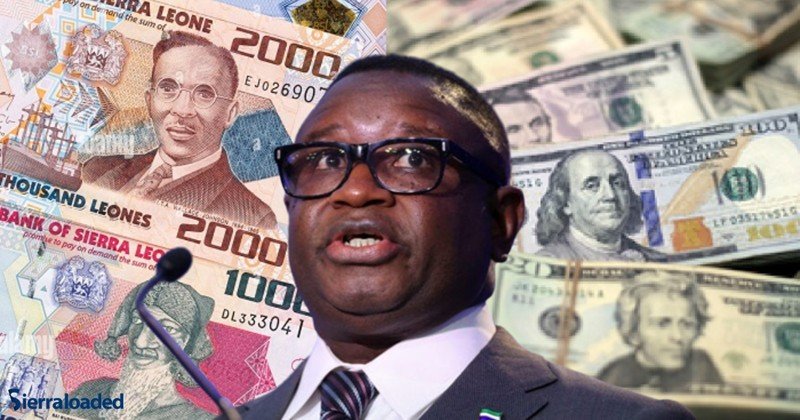By Alpha Amadu Jalloh
Sierra Leone finds itself at a critical crossroads. Since April 2018, the nation has received more than 3.75 billion United States dollars in grants, concessional loans, and international aid. Yet for many citizens, the promised improvements in daily life remain out of reach. Roads are impassable. Clinics lack medication. Schools are overcrowded. The frustration of ordinary people continues to grow as hope for meaningful change fades.
The reality is harsh. While development partners pledge billions to support reforms and recovery, government mismanagement, especially at the executive level, continues to undermine progress. The disconnect between the flow of international funds and the lived reality of most Sierra Leoneans is alarming. Where has the money gone? Why is poverty deepening even as aid flows increase? These questions demand urgent answers.
The country’s economic data paints a troubling picture. The economy experienced a modest growth rate of 5.7 percent in 2023, recovering slightly from the global pandemic’s economic shockwaves. However, this growth is projected to slow to an average of 3.7 percent between 2023 and 2025, according to the International Monetary Fund. Rising inflation, currency depreciation, and mounting import costs are major contributing factors. These economic pressures have worsened the cost of living and made life unbearable for the average citizen.
Public debt stood at 43 percent of GDP in 2024. The Bank of Sierra Leone reported only 1.8 months of import cover by mid-2025. This is dangerously below international thresholds. The government has responded by increasing taxes and fuel prices. This has tightened the economic squeeze on families and businesses.
Meanwhile, President Julius Maada Bio and First Lady Fatima Bio have spent over 28 million dollars on foreign travel since 2018. In 2022 alone, over Le71.4 billion was withdrawn as travel per diem. This excessive spending on global trips, often with large delegations, contrasts sharply with the reality at home where nurses protest unpaid wages and students sit in overcrowded classrooms. In 2023, another 8.92 million dollars was spent on similar trips. These costs are not only wasteful but offensive in a country with such fragile finances.
Despite this, Sierra Leone has continued to benefit from international support. The Millennium Challenge Corporation signed a 480 million dollar compact with the country in September 2024 to expand access to electricity. The IMF, through a 38-month Extended Credit Facility, approved 253 million dollars in late 2024 to stabilize the economy. The World Bank added 80 million dollars to support macroeconomic resilience and published new development and climate reports in June 2025.
In July 2025, Sierra Leone entered a new Country Partnership Strategy with the OPEC Fund. This includes 250 million dollars through 2030 and a 45 million dollar investment to expand the Bumbuna I Hydroelectric Plant. These investments are crucial. However, implementation and transparency remain the biggest hurdles.
At the same time, external debt is expected to reach 1.69 billion dollars by 2025. This places Sierra Leone in the high-risk category for debt distress. The country also owes approximately 67 million dollars to China. This makes China a key lender in Sierra Leone’s debt portfolio. Although China has cancelled some minor debts and offered food aid, the burden remains significant and adds to fiscal pressure.
Internally, the government’s wage bill continues to balloon. In 2025, it is projected to reach NLe7.6 billion. This is up from NLe6.5 billion in 2024 and now consumes over 3.9 percent of GDP. While salary increases of 45 percent for teachers and 15 percent across the public sector are politically appealing, they are not backed by increased productivity. As a result, infrastructure spending suffers. Service delivery continues to deteriorate.
Sierra Leone’s healthcare system remains in crisis. The country still holds one of the highest maternal mortality rates globally. Hospitals are under-equipped. Essential drugs are often out of stock. Reports of patients being asked for bribes persist. Meanwhile, government officials receive their healthcare abroad. This is funded by the same treasury that cannot provide paracetamol at Connaught Hospital.
To change course, the government must adopt urgent and bold reforms.
Ban non-essential foreign travel for government officials. Publish quarterly audits of donor funds and travel expenditures. Make all loan agreements public and pass them through parliamentary oversight. Launch a real-time public investment tracker for all donor-funded projects. Reform civil service promotion based on performance, not political connections.
Sierra Leone does not lack money. It lacks accountability. It lacks leadership that values the people above privileges. Development aid, when misused, becomes a burden rather than a blessing. If the nation continues on this path, it risks losing both credibility and support from partners.
The people of Sierra Leone deserve a government that prioritizes hospitals over hotels, schools over summits, and jobs over junkets. This is the moment for reflection. This is the time to chart a new course.
Let this be a turning point.
Alpha Amadu Jalloh is a Development Advocate and Writer based in Melbourne, Australia.
REFERENCES
1. IMF Country Report, Article IV Consultation, Sierra Leone (2024) www.imf.org
2. World Bank Country Economic Memorandum and CCDR (2025) www.worldbank.org
3. Ministry of Finance Budget Speech (2025) www.mof.gov.sl
4. Africanist Press Travel Expenditure Reports (2023 to 2024) www.africanistpress.com
5. Bank of Sierra Leone Annual Reports (2024 to 2025) www.bsl.gov.sl
6. MCC Compact Sierra Leone Announcement (2024) www.mcc.gov
7. OPEC Fund Sierra Leone Strategy (July 2025) www.opecfund.org
8. Audit Service Sierra Leone Reports www.auditservice.gov.sl
9. Statistics Sierra Leone Debt Reports www.statistics.sl








